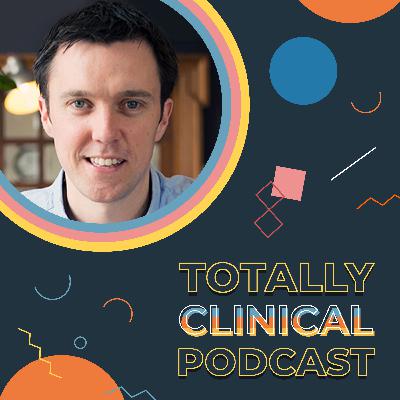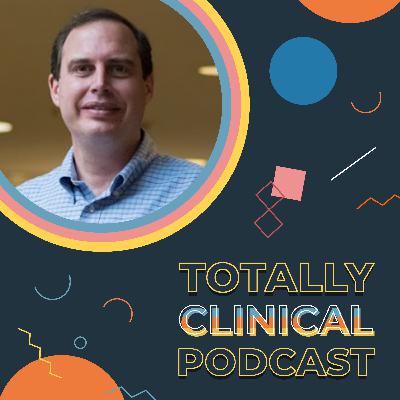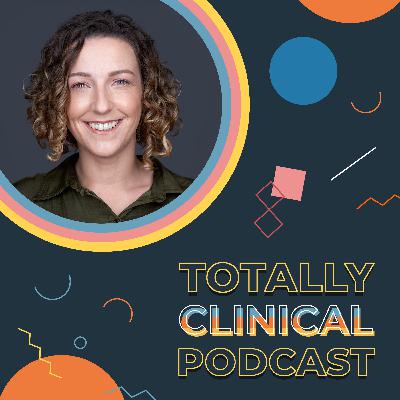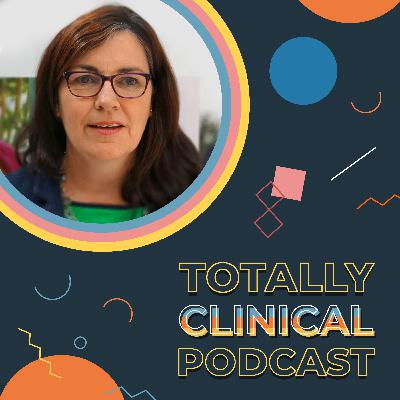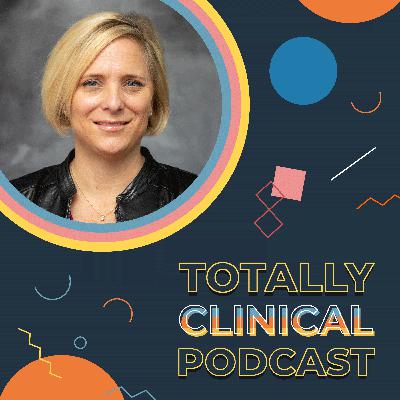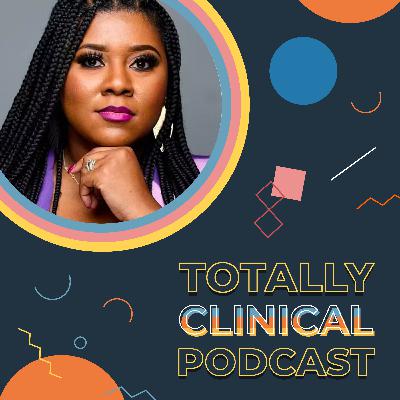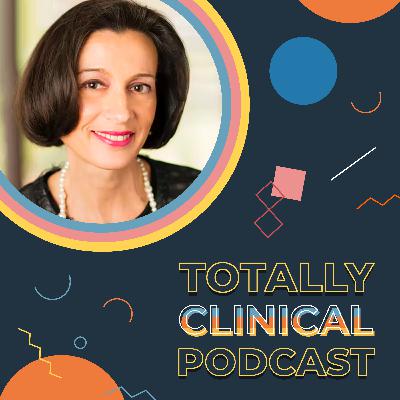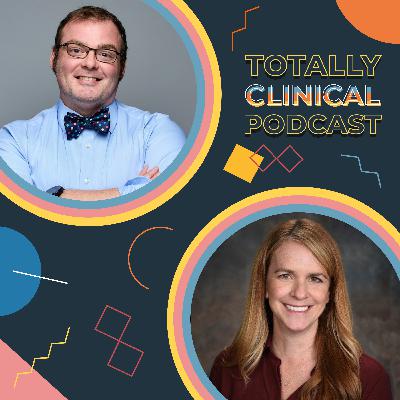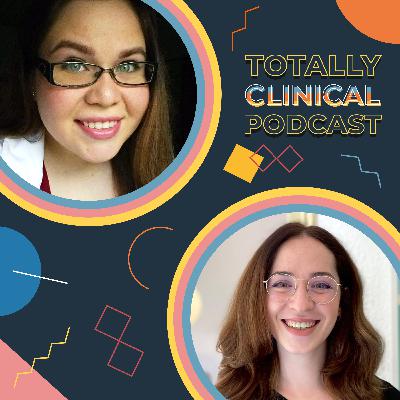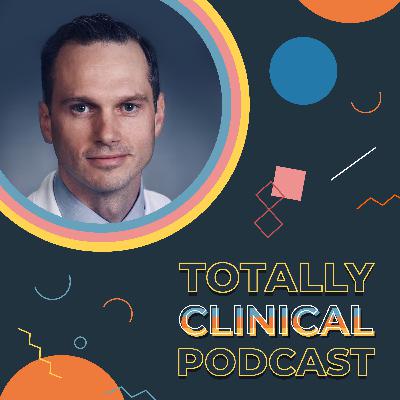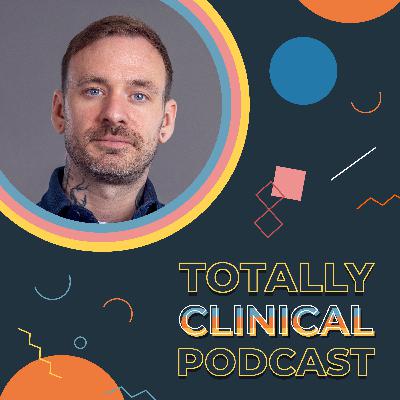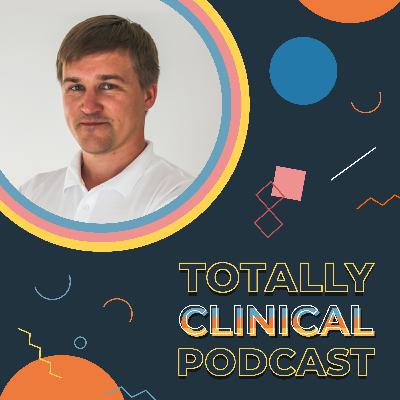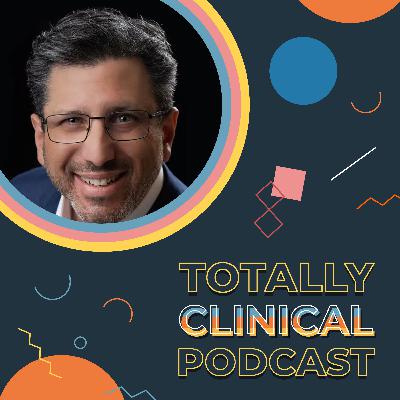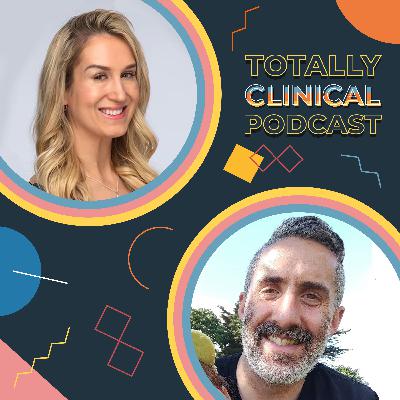Discover Totally Clinical: Trial Triumphs & Rad Trends
Totally Clinical: Trial Triumphs & Rad Trends

Totally Clinical: Trial Triumphs & Rad Trends
Author: Teckro
Subscribed: 7Played: 188Subscribe
Share
© 2023
Description
Welcome to Totally Clinical! From protocols to placebos to patients, Teckro takes you on a deep dive into the freshest trends, big-time challenges and most excellent triumphs of clinical trials. Join us as we chat with industry experts, trailblazers, thought leaders and the people actually benefiting from clinical research. Totally Clinical illustrates Teckro’s devotion to the clinical trial industry and our mission to create faster, more efficient trials that will get drugs to market quicker and save lives. Tune in, settle back and don’t touch that dial - it’s time to get Totally Clinical!
© Copyright 2022 Teckro.
© Copyright 2022 Teckro.
73 Episodes
Reverse
This week, Teckro Program Director Brian Deighan joins the podcast to talk about how sponsors are using Teckro to better engage their research sites. Brian explains how innovative approaches in sponsor communication improve relationships with investigators and discusses how surveys are an underutilized tool for sponsors to understand their sites.“Email chains for information can get lost, items can get misunderstood, or things may be taken out of context. Teckro and our survey functionality allows for that direct line to sites and really hearing everything firsthand.”
This week, Lexitas Pharma Services' George Magrath joins the podcast to discuss his unique dual perspective on patient care as both a CEO and a physician. George shares how his double role gives him a better understanding of patient needs and helps Lexitas to stand out in a competitive market. “I love taking care of patients. It's really quite a privilege and quite an honor to be able to do that. I think it keeps me really grounded with the purpose of what I'm doing, which is trying to advance our care.”
In this episode, freelance medical translator Ana Sofia Correia joins us to discuss the need for translation in clinical trials. She explains the risks if clinical trial material is biased towards English-speaking populations and the need for cultural sensitivity when translating content into local languages. Ana Sofia also reflects on the benefits AI could have on the industry and for translators.“While AI can be a powerful tool, it cannot replace human translators because there are still many aspects of translation that require human judgment and human expertise, such as the ability to understand those cultural nuances.”
Frances Reid, program director at the World Ovarian Cancer Coalition is back with an update on the Every Woman Study, the first of its kind to quantify global challenges women face with diagnosis and care access for ovarian cancer. Building on the survey's success, Frances explains how they have pivoted from online to other data capture methods with the help of healthcare providers in some of the most remote settings in the world. The stories she shares give us a glimpse into the incredible challenges women face in middle- and low-income countries. “It took 18 hours in an ambulance that she and her family had to pay for. And she received the surgery. And then she went home to recuperate, and the team were trying to encourage her to come back. But the woman and her family couldn't afford to raise the money to come back.”You can find out more information and follow the progress of the Every Woman Study here.
This episode we have something a little bit different as we talk with Karl McGrory, director of Europe at One Tree Planted. As an international nonprofit focused on reforestation, One Tree Planted has garnered widespread support from many sectors, including the pharmaceutical industry. Teckro has partnered with One Tree Planted and contributed to a project in Ireland, home to our HQ. Karl talks about Ireland’s significant deforestation over the centuries and upcoming projects they have around the world.“There's an old folklore that said a squirrel could travel from the south of Ireland to the northern tip without touching the ground. That's how forested it was. So, it really is important that we restore some of the trees to that landscape.”
What risks pose the greatest threats to clinical research? This week, Jeanne Hecht of JTH Consulting joins us to answer this very question. During this episode, Jeanne talks about some of the current risks facing the life sciences industry and her concern about what the workforce shortage means to clinical research. Jeanne puts out a challenge to the industry to adopt a new mindset and think out of the box to attract talent in clinical research. “I think it’s a challenge to each and every one of us to no longer be ok with the status quo. We need to constantly be looking within and externally to what we and others can be doing better to advance clinical research.”
Have you ever had a chance encounter that changed the course of your life? That’s what happened to Danielle Mitchell, CEO of Black Women in Clinical Research. She discovered clinical research as a career path during a conversation at a pool party. After landing a clinical research coordinator role, she noticed the stark lack of diversity among staff. Since then, Danielle has been on a mission to educate and empower Black women to succeed in the industry. “A lot of times when I talk to my members, they will say that they stumbled upon clinical research and that's not the way it should be. We should be telling college students, telling everyone about clinical research as much as possible.”
This week Dr. Martine Dehlinger-Kremer, vice president, scientific affairs, pediatric subject matter expert at ICON, joins us for a deep dive into the inclusion of adolescents in clinical trials. Martine talks us through the considerations for including adolescents in adult clinical trials and how to overcome potential challenges. She also highlights disease areas where the inclusion of adolescents in adult trials has proved successful and why she is optimistic for the future. “Trial sponsors, investigators, regulators and ethics committees are encouraged to challenge research orthodoxy related to adolescent inclusion and adult research and seek trial solutions grounded in science rather than legal definition of age alone.”Dr. Martine Dehlinger-Kremer is also chair of the Children's Medicines Working Party at the European Forum for Good Clinical Practice, as well as chair of the Pediatric Working Group of the European CRO Federation.
This week we’re joined by former CRA Maria Milas and site advocate Silvina Baudino to discuss how to make investigator meetings (IMs) more exciting. Attending an IM can mean endless PowerPoint presentations and days of repetitive meetings – but there is a better way. Maria and Silvina explain how by recasting the agenda for greater interaction, attendees will be more engaged and retain more about the study. “It was four intense days of meetings of trainings, of talks from 8 a.m. to 6 p.m. every single day. Now, how does this look? Well, PowerPoint after PowerPoint after more PowerPoint.”
Phase I oncology trials play a crucial role in drug development, yet they are extremely challenging for sites. To discuss this in greater detail, we’re joined by Dan Otap, principal, alliance and partnerships lead at Genentech, and Jenn Weinberg, a veteran in oncology clinical trials. During the podcast, they delve into why early-stage oncology trials are so complex and ways to ease the burden on sites.“There's a level of safety and concern and risk that separates and creates a very distinct space when you're talking about early phase oncology. The fact that these patients that become brave participants on these trials are immunocompromised, severely sick, heavily pre-treated – you have a scenario fraught with potential complications.”As Dan discusses in the podcast, the Society for Clinical Research (SCRS) has recently launched a white paper on best practices to build out Phase I units in institutions.
Ashley Margo, founder of the The Clinical Research Circle, along with Teckro’s Maria Milas, join us to discuss clinical research associate burnout. Earlier this year, they explained how CRA burnout is negatively affecting the industry. In this follow-up episode, they highlight solutions to reduce pressure and increase job satisfaction. “If you provide them with a tool that will suit their needs, their pains and their challenges will be just covered and fulfilled. So, what better than having a happy CRA who knows that they are supported by their CRO or by their sponsor?”
When Writer Ira Feinstein was diagnosed with the BRCA1 breast cancer gene at just 20 years old, he was determined to learn everything he could about genetic research. Nearly a decade later, a landmark study led Ira to get a mastectomy and hysterectomy. During this podcast, Ira describes his unique patient journey, elaborating on the pitfalls of navigating the medical system as a trans man.“I looked at my medical records because I was moving from one cardiologist to another, and I noticed that they had ‘she’ all over the notes. And it was a very strange experience because the doctor had been very welcoming, and he had said he had worked with trans patients before.”Contact Ira for speaking engagements and to learn more about his first book Cut Off.
This week we welcome Perla Nunes, community outreach director at Greater Gift. Ecuadorian-born Perla is passionate about diversity – with specific focus on the Hispanic community. During this episode, she explains how Greater Gift is encouraging a new generation of leaders from diverse backgrounds through its scholarship program and why bilingual staff are key to build trust among patients.“I always ask if studies are offered in Spanish. The response I always get is, 'yes, everything has been translated to Spanish, IRB approved, and they have everything set up in Spanish.' So my follow up question is: 'The enrollment sites, do they have bilingual staff?'"
This week, Ashley Margo, remote site monitor and founder of The Clinical Research Circle along with Teckro’s Maria Milas, a former CRA, join the podcast to explain the impact of burnout on the clinical trial industry. Ashley and Maria talk about the problems presented with high CRA turnover and how this hinders site engagement and relationships.“If you get new CRAs on a regular basis on a study, it's going to be harder for the sponsor to create a relationship with the sites because the CRA is the person who represents the sponsor or the CRO when you get to sites.”
This week on the Totally Clinical podcast we’ve something rather special for the holiday season. But first, are you sitting comfortably? Draw the curtains, light a crackling fire and settle back to enjoy a nostalgic festive story with a Teckro twist – from our very own Chief Medical Officer Brendan Buckley… "A long grueling day and a tiring shift, but Teckro was ready – this was our gift. A spring in our step, not a moment to lose, this was the time for excellent news..."
This week, we’re joined by David Grew, a radiation oncologist and the founder of PRIMR – a platform that creates simple, illustrated videos to educate patients about cancer and clinical trials. During the podcast, David explains why he is transforming his “slapdash sketches” into video content and the power of video to help physicians communicate complex topics. “I said, 'Well, maybe I should just start converting these paper drawings into video assets so that we can kind of standardize this educational experience for our patients and introduce a lot more scale.'”
Diagnosed with a rare form of cancer in their late twenties, Stewart O’Callaghan was determined to make a difference for others. After the complexity of navigating the healthcare system as an LGBTQ+ patient, Stewart set up Live Through This, the UK’s only charity that supports and advocates for LGBTQ+ people affected by cancer. Stewart discusses hopes and ambitions for the future and explains why people shouldn’t fear “getting it wrong.” “There is a willingness to change, but a fear of getting it wrong. And I see this across research and health and third sector. I think a lot of people now understand that there is a duty to be representative of the general population or minoritized populations and there is a duty to have this intersectional lens.”
This week we host Roman Fishchuk, physician and principal investigator based in western Ukraine. Joining us moments after returning from an air raid shelter, Roman discusses life for the average person in Ukraine right now. He also describes keeping clinical trials going in a country at war and how Teckro becomes of even greater value in times of disruption.“We are really encouraging companies to come to, to resume their work in Ukraine, because right now, clinical trials are needed here more than ever.”
This week, Craig Lipset, advisor and founder at Clinical Innovation Partners, joins the podcast for a look into the future. Craig explains why he is optimistic for decentralized and hybrid models, considerations for more physicians to participate and the support the broader clinical trial ecosystem will need to ensure compliance and safety of clinical trials. “If decentralized can let us enable a visit to take place at home or in a pharmacy, how can decentralized enable us to host those study visits inside the offices of a treating physician in the community?”
When we first launched Totally Clinical: Trial Triumphs & Rad Trends as an industry podcast, we weren’t sure what to expect. Now, with a wealth of amazing guests, a catalog of compelling discussions, and a pipeline of big ideas - we can proudly say it's a hit!To celebrate 50 episodes in less than a year, host Hannah Lippitt and producer Conor Bryce sit down to discuss the journey so far. From pre-launch nerves to favorite episodes (too many to count!), take a peek behind the curtain with us and celebrate Totally Clinical hitting the big 50. Of course, we couldn’t have done it without you, the listeners. Here’s to the next 50 episodes!“We're seeing a tipping point where rather than us having to go out and search for guests, they're coming to us. It's getting to the place that we dreamed about, what we were first thinking about when we started.” - Conor"I feel that the podcast has really taken on a life of its own and is making its mark.” - Hannah


